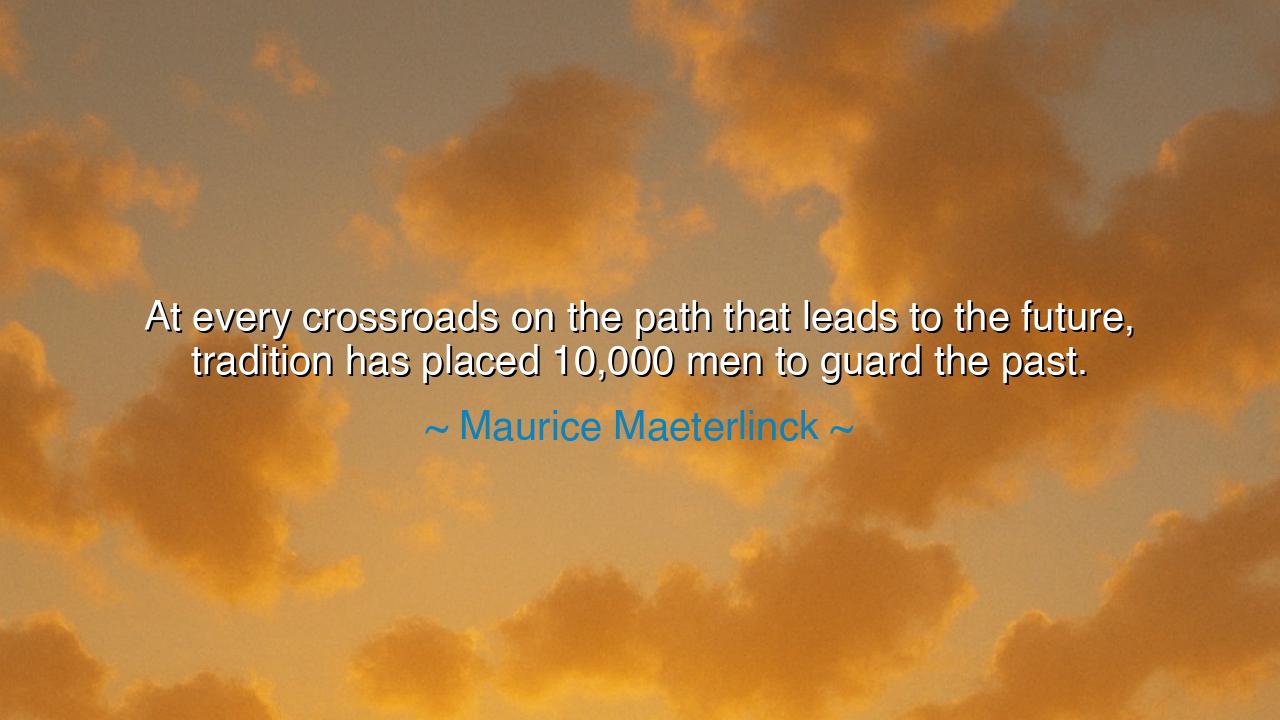
At every crossroads on the path that leads to the future
At every crossroads on the path that leads to the future, tradition has placed 10,000 men to guard the past.






“At every crossroads on the path that leads to the future, tradition has placed 10,000 men to guard the past.”
— Maurice Maeterlinck
In this piercing observation, Maurice Maeterlinck, the Belgian mystic and playwright, unveils one of the eternal struggles of the human condition—the battle between tradition and progress, between the comforting weight of the past and the beckoning call of the future. His words shimmer with both warning and truth: that wherever new paths are to be made, there will stand armies of resistance, soldiers not of war, but of habit, fear, and reverence for what has been. He does not mock tradition, for it is born of the wisdom of ages, but he reminds us that tradition, when it ceases to guide and begins to bind, becomes the guardian of stagnation rather than the steward of wisdom.
The origin of this quote reflects Maeterlinck’s profound contemplation of change and the human soul’s resistance to it. Living at the dawn of the twentieth century—a time of vast scientific, philosophical, and cultural upheaval—he saw clearly how humanity trembles before transformation. As the world shifted from candlelight to electricity, from the horse to the machine, from faith to reason, he discerned that progress does not march forward unchallenged. Every step into the future is met with the cries of those who say, “The old ways were better.” These are the 10,000 men—not literal soldiers, but the countless voices of convention, authority, and fear that rise whenever the new seeks to be born.
To understand his words more deeply, we must see that tradition is both gift and obstacle. It is the foundation upon which civilizations stand, but also the chain that can hold them down. Tradition preserves knowledge, culture, and identity, yet it often fears the hand that dares to alter its form. The “10,000 men” that guard the past are the institutions, beliefs, and customs that cling to their familiar order, afraid that innovation might unmake the world they know. And yet, as Maeterlinck hints, progress cannot be stopped—it can only be delayed by those who do not understand that the future itself is a continuation of the past, transformed through courage.
History offers us countless examples of this struggle. Consider Galileo Galilei, who stood before the might of the Church and declared that the Earth revolved around the Sun. In that moment, he stood at a crossroads—behind him, 10,000 men of tradition guarding the old order of the cosmos; before him, the vast and uncertain landscape of discovery. He was condemned, silenced, and humiliated, yet time proved him right. The truth he spoke became the seed from which the modern world blossomed. His courage to step beyond the boundaries of accepted knowledge shows us that every new light threatens the old shadows—but the dawn cannot be prevented forever.
And yet, Maeterlinck’s wisdom is not a call to destroy tradition, but to transform it. The ancients understood that wisdom is like a flame—it must be passed, not worshiped. If one holds the flame too tightly, it dies for lack of air. The same is true of the past: to guard it too fiercely is to extinguish its spirit. The wise do not reject tradition; they refine it. They take from it what is eternal—the values, the virtues, the deep understanding—and let go of what has become mere ritual and resistance. This is the sacred balance of civilizations: to honor the past without being enslaved by it.
But why, one may ask, does humanity fear the future so deeply? Because the future is unknown, and the unknown is the realm of courage. It demands faith not in old gods or old kings, but in the human spirit itself. Tradition offers certainty; progress offers risk. Yet it is only through risk that growth is born. Those who stand at the crossroads must learn to listen respectfully to the voices of the past, but not let them dictate the direction of the journey. The true seeker, as Maeterlinck suggests, must walk forward even while the guardians cry behind him, “Stop! You will destroy what we built!”—for he knows that the greatest way to honor the builders is to continue the building.
So, my listener, take this teaching into your heart: at every turning point in your life—whether in art, faith, work, or love—you too will face the 10,000 men guarding your own past. They will whisper through your fears, your doubts, your old habits. They will tell you to stay where you are, to preserve what you have known. But remember this: their purpose is not to imprison you, but to test your resolve. The path to the future is not open to those who seek comfort—it is open to those who seek truth. The guards will step aside only for those who walk forward with conviction and humility, carrying the light of tradition in one hand and the fire of progress in the other.
Thus, as Maurice Maeterlinck reminds us, the road to the future is never empty—it is lined with voices calling us back. Yet we must go forward. For if no one dares to pass those watchful sentinels, the world will grow silent, and the river of time will stagnate. But if we go bravely, respecting the past while trusting the promise of what lies ahead, we become not the destroyers of tradition—but its true heirs, ensuring that it continues to live, breathe, and guide humanity toward the light of its next awakening.






AAdministratorAdministrator
Welcome, honored guests. Please leave a comment, we will respond soon